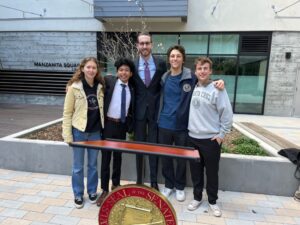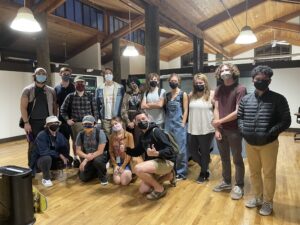

Interview by Alyce Thornhill
Alyce Thornhill 5:03
I am here with Laz Meiman of the Student Housing Coalition. I was hoping that you could introduce yourself with your name, your pronouns, and then your position in your organization.
Laz Meiman 5:45
Yes, Laz Meiman and he/him pronouns. And I’m the Vice President of Policy at the Student Housing Coalition.
Alyce Thornhill 5:51
Great. Could you introduce your organization and talk a bit about its foundation and your mission?
Laz Meiman 5:57
The Student Housing Coalition is dedicated to creating a more equitable housing situation here in the Monterey Bay region. We actually started right before COVID, with students from Cal State Monterey, as well as some Santa Cruz students. But then when the pandemic hit, it kind of dissolved. And then recently, in October of 2021, our president Zennon Ulyate-Crow basically recreated the Housing Coalition and brought me on board and brought a few other people on board. And now we’ve gotten to about 360 activists. So it’s been an insane amount of growth in a very short amount of time.
Alyce Thornhill 6:33
Awesome. I wanted to ask a few questions about the bill that you mentioned you wanted to focus on today. When we previously spoke about SB 86, which is a new housing streamlining bill, we talked a little bit about its outline. And I definitely want to get into those intricacies soon, but I was wondering if you could just summarize the bill for our listeners.
Laz Meiman 6:55
So SB 886 provides statutory exemptions from CEQA, which is the California Environmental Quality Act for on campus student and faculty housing projects. So essentially, what this would do is remove a layer of red tape for building new housing. And of course, we decided to do this because CEQA, it was originally really well intentioned as an environmental bill, but it has since become a bludgeon for anti housing groups who want to block housing from being constructed. So what they do is sue any kind of new student housing development and hold it up for years and years of litigation. I mean, this notably happened with UC Berkeley recently, where they had to reduce their admissions by 5100 because of a CEQA lawsuit. So this is having, you know, measurable impacts. So that’s essentially what our bill is seeking to address.
Alyce Thornhill 7:46
Yeah, I read a little bit about CEQA. And that’s the California Environmental Quality Act. And specifically at Berkeley, it seems like the community had a lot of power in that sense. And it was preventing students from enrollment and from also becoming a part of school and obtaining their degree. And then, I guess, on the topic of UC Berkeley, which pretty infamously has a houselessness problem. So does Santa Cruz, you know, not necessarily a problem but more of an epidemic. I was wondering how has your organization worked with houseless populations? And also, what do possible solutions look like for houseless students who cannot necessarily afford on campus housing, even if that’s an option for them?
Laz Meiman 8:27
Well, actually, UC Santa Cruz has the highest rate of student homelessness in the UC system. It’s around like 9% right now, which is just insane. And some of our members have actually experienced homelessness in the past, we’ve also been working with Slug Shelter, which is another organization on campus, which is seeking to create a homeless shelter on campus. And so we’ve been doing work with them. We’ve also done outreach with various groups in town, particularly recently with the oversized vehicle ordinance that went through city council and then the planning commission later, we partnered with a few groups there that are, you know, houseless advocacy groups. And I think to sort of address the issue of, you know, what options does, you know, a houseless person in Santa Cruz have? Really, there aren’t many at the moment. And that’s the problem. And that’s what we’re trying to address, you know, so what we’re doing is the Student Housing Coalition is advocating for more housing and more affordable housing, to sort of get to the root of what this problem is. And we’ll do that through whatever means we think is fit. So whether that’s, you know, advocating for new developments, or for more affordability within those developments and existing developments.
Alyce Thornhill 9:37
Thank you. I kind of wanted to delve a little bit into the controversy with Scott Wiener. I think it’s worth bringing up that the bill is sponsored by State Senator Scott Wiener, who has faced plenty of controversy for campaign contributions coming from the real estate industry. In 2018, housing activists confronted him as he presented at UCLA, criticizing his fueling of gentrification, and his trickle down housing agenda. I wanted to ask if you feel as though Senator Wiener’s platform has changed? And if not, do you anticipate any other students active in organizing around housing, may might resist his involvement in this movement?
Laz Meiman 10:16
Well, I mean, I think when you think about legislation, what I can speak for with this bill is what the bill does, you know, and the bill will be good for student housing, and it will reduce the student homelessness epidemic. And so I think, when we’re thinking about, like, who’s going to sponsor it, the sponsor is more of a vessel for the bill itself. And I understand that there is controversy with Scott Wiener, and I don’t really want to speak to that, because I haven’t like been on the scene in San Francisco, and what he’s been doing, but I will speak for the efficacy of the bill, and what the bill will do and how the bill will help. But I will say, as an organization, we are definitely pro affordable housing, we are definitely pro affordability. And we are very anti gentrification. And we understand that a lot of times new developments can lead to gentrification, and we are doing everything we can to ensure that the new developments that are built in Santa Cruz won’t contribute to the increasing gentrification, in fact, we think it could reverse or slow down gentrification.
Alyce Thornhill 11:15
Thank you. Thank you for that answer. I wanted to go a little bit back to what we were talking about with the oversize vehicle ordinance. And we know that with housing, equity issues comes issues of policing as well. And I wanted to talk a little bit about the COLA movement. And I know we had talked previously that perhaps it was part of the environment that this movement came out of, but maybe not a direct contributor. But I would say that with the COLA movement, the Cost of Living Adjustment, there was an emphasis on housing as a multifaceted issue. And many organizers of this time have in continued to advocate for higher wages, decrease the policing on campus and justice for undocumented, disabled and other marginalized students on campus. So my question is, if you believe your organization approaches housing, as both a race and class issue, and if so how does your organization seek to fight first and foremost, for these marginalized populations?
Laz Meiman 12:13
Oh, well, of course, I mean, obviously, we understand that housing is directly tied into race and class. And with COLA, you know, there’s definitely, you know, the idea that the environment that COLA was happening in also led to the Student Housing Coalition in this rebirth of activism on campus. And I think that, when it comes to bringing up these specific issues of class, what we do is we work with different organizations, like as a coalition, you know, if there’s one group that deals particularly with marginalized communities, or one group that deals particularly with tenants rights or different things, they can come to us, and we’ll use our activist base to help them out. So I think that while we are not directly focused on some of those issues, we provide a crucial support base for issues like that. And also where you have very close ties to YDSA, a lot of our members are also involved in other groups as well. So I think in terms of understanding housing as a multifaceted issue, we’re definitely there. And we definitely support different movements that are related and interconnected with housing.
Alyce Thornhill 13:18
Thank you. And you mentioned that your organization works in collaboration with different orgs. I was wondering a little bit about, who makes up your organization. You mentioned to me that first years kind of led the org, which I thought was very interesting, and really great that people new to Santa Cruz, especially coming from an isolated quarantine time were getting involved in activism. But you also mentioned that you had over 316 members. So I was wondering if you could talk a little bit about that. And how potentially to get involved if someone is interested in joining this movement?
Laz Meiman 13:53
Yeah, no, absolutely. So yes, so first years have been like leading this. But it hasn’t just been first years, we’ve had a lot of great guidance from older students as well. And so I think really, the reason that we’ve expanded so much is because there’s a recognition that there is a dire need for housing in a 9%. As I said earlier, 9% of UCSC students are experiencing homelessness, you know, we’re not doing this because we think that it’s just a fun thing to do, or that we want to be activists, we’re doing it because this is literally what we need. We literally have to have somewhere to live, we need somewhere to rest at night. And that’s at the root of what this issue is. And so I think that’s why we’ve expanded to like over 360 members already. And in terms of you know, if you want to get involved or if whoever’s listening wants to get involved personally, you can definitely check out our Instagram, which is @ucschousingcoalition, or you could check out our website, which is the studenthousingcoalition.org. And those are both, you know, areas where you can find our activism links as well as a link to different Action Network items.
Alyce Thornhill 15:05
Yeah, thank you for that information. And just sort of wrapping up this interview, I wanted to ask a little bit about the future of the Student Housing Coalition. Obviously, this bill is a focus right now. But what does the next few months next few years perhaps look like for your organization, especially as we hopefully near the end of the COVID pandemic?
Laz Meiman 15:28
Well, I think for now, we’re looking at a lot of different city and county resolutions. We’re working on parking minimums, which is a whole nother issue about transit equity and making sure that people who don’t drive cars can still get around Santa Cruz. So we’re looking at that, we’re looking at other potential bills for the future. And we’re just looking to expand our base and to get more people involved and to really spearhead this whole energy of student activism that’s all on campus and sort of coalesce all of this desire for equitable housing. And so I guess that’s what we’re looking forward to over the next months and years.
Alyce Thornhill 16:07
That sounds great. Is there anything else you wanted to add or anything you want our listeners to know about your organization, the work you do?
Laz Meiman 16:15
I think that I want listeners to know that we are genuinely an organization of students who are concerned about housing. We’ve received some accusations online of being developer funded or all these various things. And we also suffer from abusive developers and abusive landlords. You know, we’re not saying that we are totally pro all kinds of housing and pro anything, like we are for affordability and we are for students, and students are at the forefront of what we do here. And we want to make sure that everyone you know, both on campus and off knows that this is a student organization, and that we are seeking for equitable housing. We’re seeking equitable housing in Santa Cruz.
Alyce Thornhill 16:57
Thank you so much for talking with me. Thank you really appreciate it.

